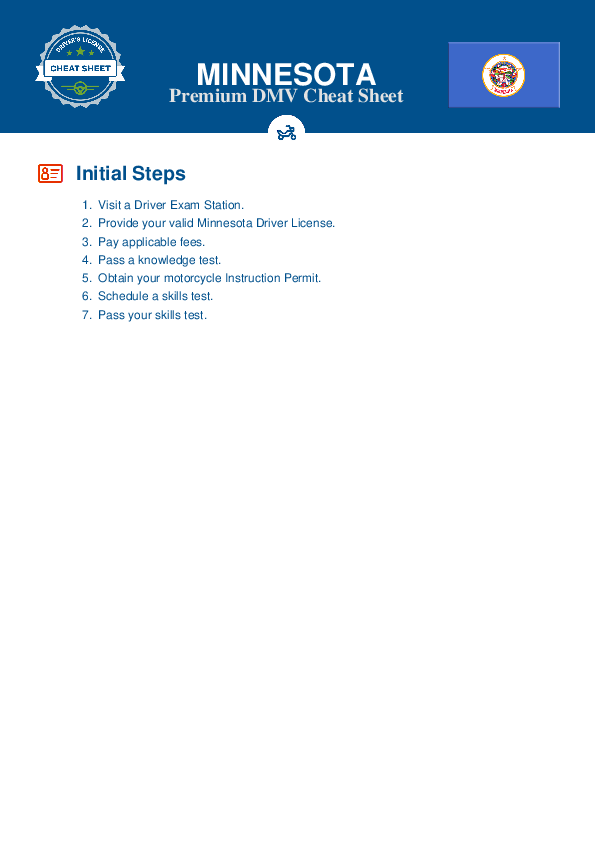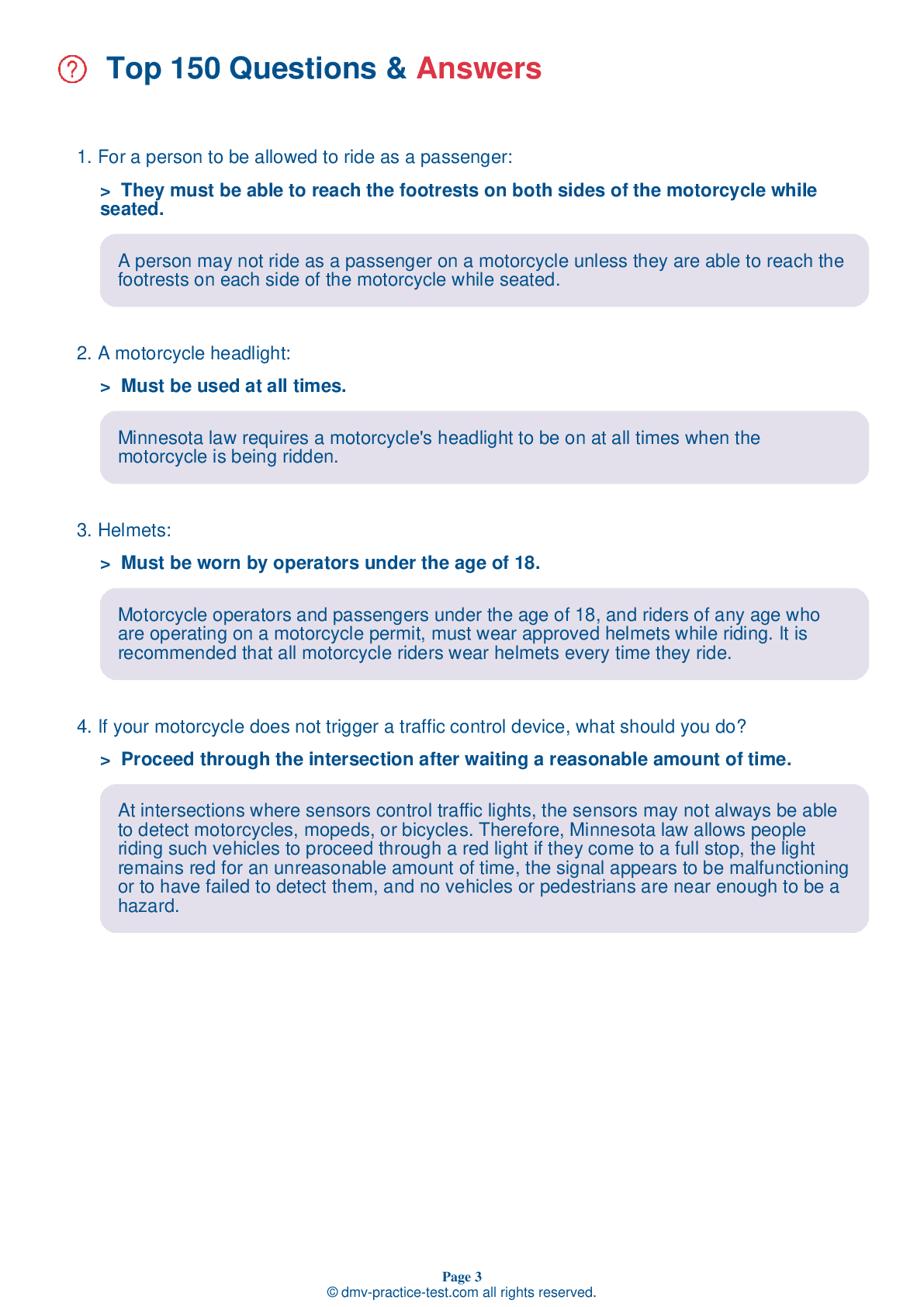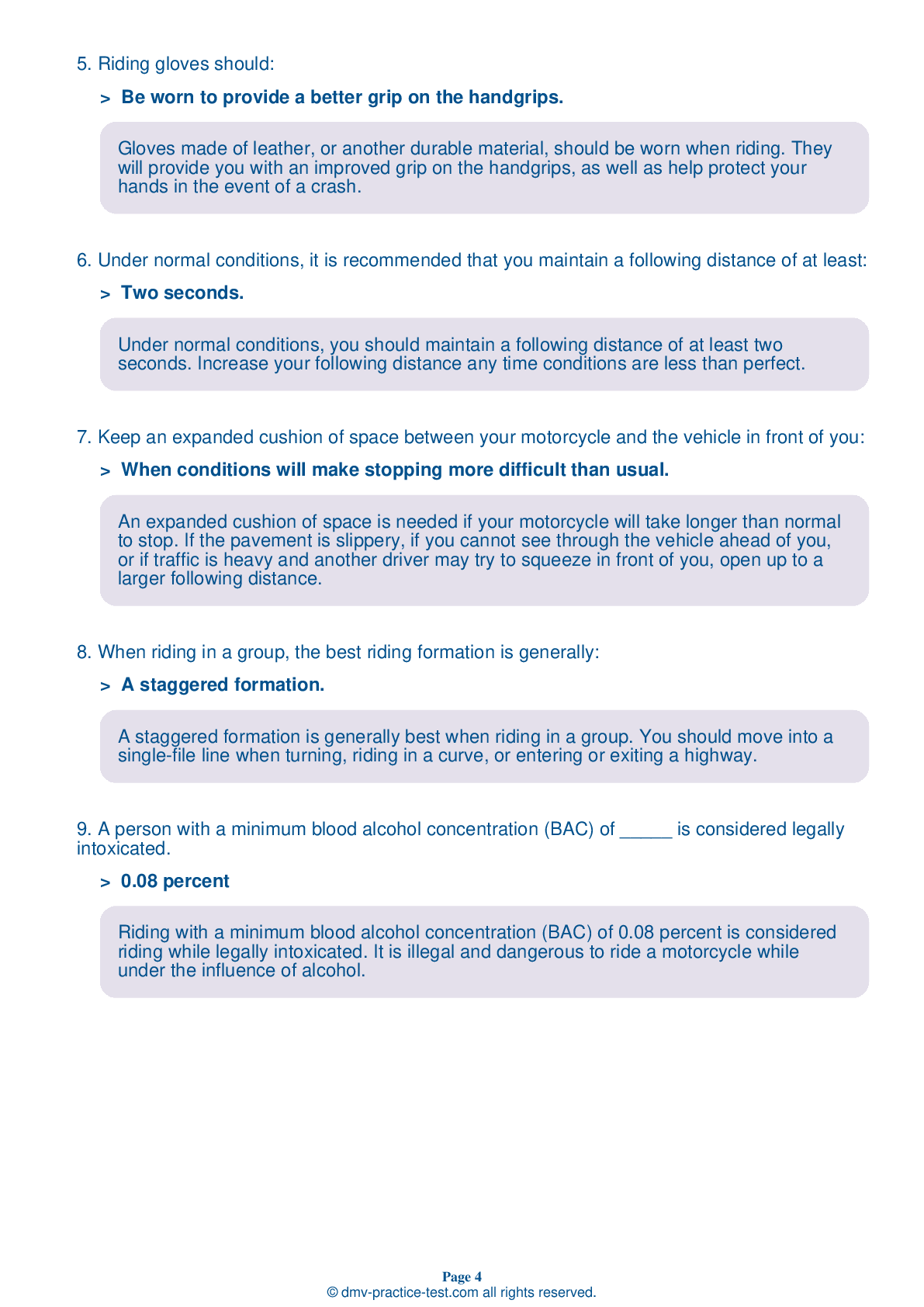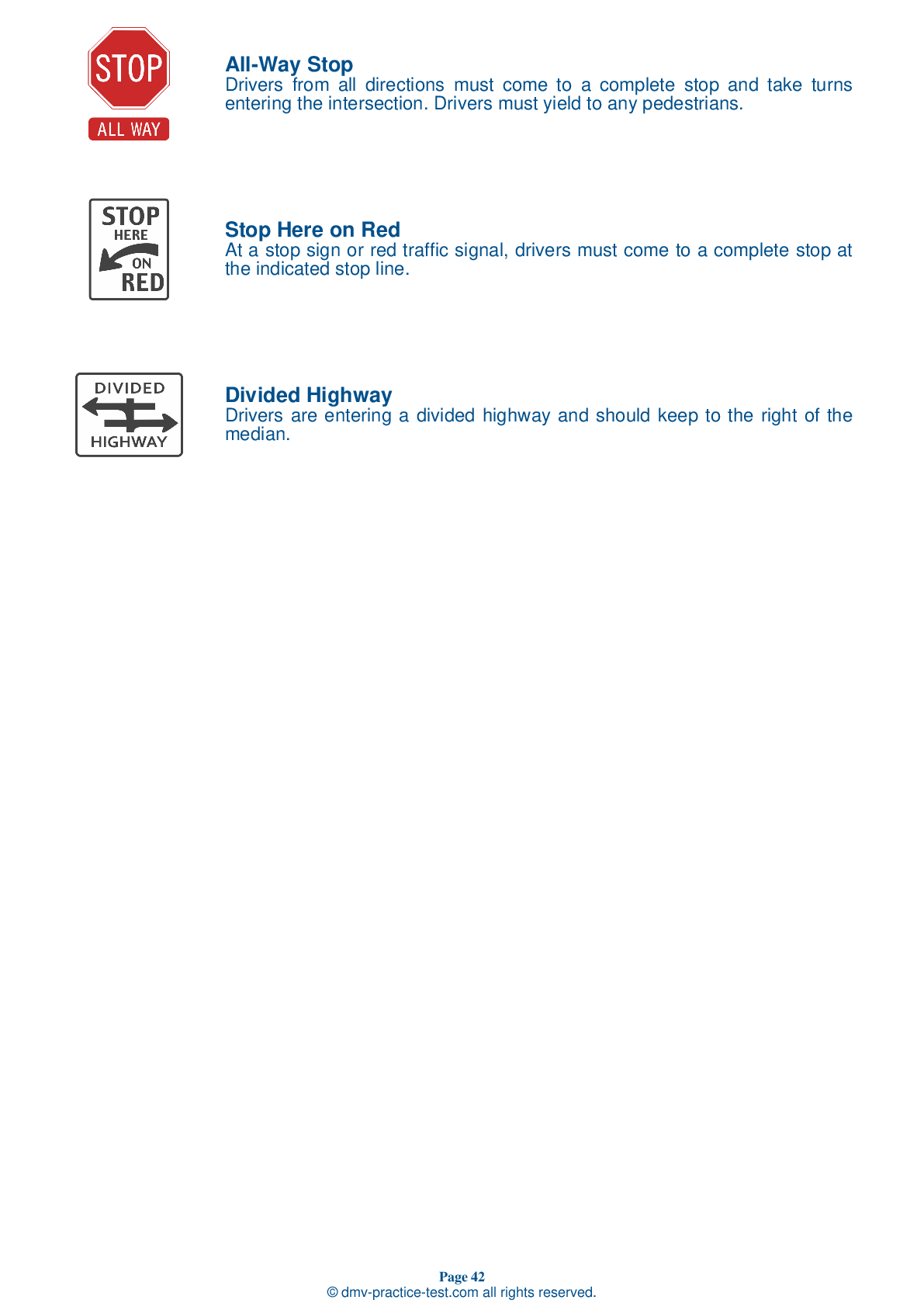DMV Permit Test #3
Motorcycle Test | License MN 2026 | FREE Online Practice! #3 Page 3 of 5
Take this FREE motorcycle test (license in MN 2026) to check your knowledge of the road rules. To improve your results, download a motorcycle handbook online, study theory, and practice for free on our website. Still worried about how to get a motorcycle license in Minnesota in 2026? Check our website for more sample tests, train as much as possible, and boost your grades!
40
32
16
17 . Snow and ice melt:
Faster on some sections of the road than on others.
Snow and ice melt faster in some places than in others. Places that are likely to remain frozen for the longest periods of time include low areas, shaded areas, bridges, and overpasses.
18 . Where is the clutch lever usually located?
Near the right footrest
The clutch lever of a motorcycle is usually located on the left handgrip.
19 . Penalties for riding while impaired may include:
All of the above.
If convicted of a DWI, you may face fines, license suspension, jail time, court costs, legal defense fees, an insurance rate increase, and community service. If you have been drinking, it is best to stay off your motorcycle.
20 . When carrying a passenger or cargo:
It may take less time to accelerate and stop.
Because of the additional weight added by cargo or a passenger, motorcycles may take longer to accelerate and stop than they would if only transporting the operator.
21 . If your front tire locks while braking, you should:
Release the brake lever until the tire regains traction.
If your front wheel locks while braking, you should release the brake lever until the tire regains traction and re-apply the brake.
22 . When carrying a passenger, you should:
Instruct the passenger after you begin your trip.
You should transport a passenger only if your motorcycle is appropriately equipped and adjusted to do so. Among other things, your motorcycle should have separate footrests for the passenger and a seat that is large enough for more than one person to sit comfortably. You may need to adjust your headlight, tire pressure, and suspension to accommodate the extra weight of a passenger.
23 . If no traffic is present when you are taking a curve, it is a good idea to start:
Wherever you prefer.
If no traffic is present when you are taking a curve, start on the outside of the curve to increase your line of sight and the effective radius of the turn. As you turn, move toward the inside of the curve. As you pass the center of the curve and prepare to exit, move back toward the outside position. Remain aware of changing road and traffic conditions and adjust as necessary.
24 . This road sign means:
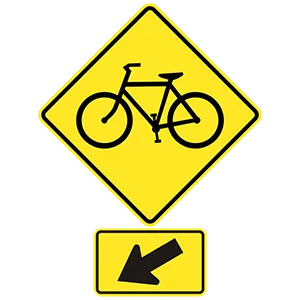
Soft shoulders.
This sign (with the arrow below) indicates the location of a bicycle crossing/path. Drive with caution around this sign because bicycles likely regularly cross or ride beside traffic in the area.
Need Motorcycle Insurance? No problem!
Compare the best rates in Minnesota and find a personalized policy that meets your needs.
1. Are You Currently insured ?
2. Married ?
3. Do you own your Home?
4. Have you or a Family Member Honorably Served in U.S. Military ?
5. Your Name
6. Age
7. Zip code
Ranked by best match
2026 Minnesota | Frequently Asked Questions
To acquire a motorcycle driver's license in Minnesota, you must first obtain a motorcycle instruction permit. This requires passing a written exam. After gaining experience, you can apply for a motorcycle endorsement on your driver's license. This involves passing both a skills test and an on-road test. You must also pay the necessary fees.
In Minnesota, the minimum age to obtain a motorcycle permit is 16 years old. However, if you're under 18, you must also have a valid driver's license, complete a state-approved motorcycle safety course, and hold your motorcycle instruction permit for at least six months before you can get a motorcycle endorsement on your license.
Yes, you do. In Minnesota, a dedicated motorcycle endorsement is required to legally operate a motorcycle. This endorsement can be added to your existing driver's license after passing a written test and a road test. If you are a new rider, you may also need to complete a state-approved motorcycle safety course.
To apply for a motorcycle driver's license in Minnesota, you'll need several documents: proof of identity (like a birth certificate or passport), your Social Security number, proof of residency in Minnesota, and if applicable, your current driver's license. If you're under 18, you'll also need a parent or guardian's signature on your application form.
Yes, you will need to take a written exam to get a motorcycle license in Minnesota. This test ensures you understand the rules of the road, safe riding practices, and Minnesota's specific motorcycle laws. If you successfully complete a state-approved motorcycle safety course, the riding skills test can be waived, but the written exam is still required.
The written test for a motorcycle license in Minnesota covers a variety of subjects related to motorcycle operation and safety. Topics include traffic laws, road signs, safe riding techniques, handling dangerous situations, and understanding motorcycle equipment. The test is designed to ensure riders are knowledgeable about the rules of the road and can operate a motorcycle safely.
In Minnesota, completion of a state-approved motorcycle safety course can waive the written and skills test required for a motorcycle endorsement. The course includes classroom instruction and hands-on riding exercises. Upon successful completion, you'll receive a certificate which you can present at the DMV to obtain your endorsement, bypassing the standard tests.
Enrolling in a motorcycle training course in Minnesota involves finding a state-approved training school, signing up for a suitable course, and paying the necessary fees. Courses typically include classroom instruction and hands-on riding practice. After completing the course, you will receive a certificate which can be used to waive the skills test when applying for a motorcycle endorsement.
No, you don't need to own a motorcycle to take the license test in Minnesota. You can use any street-legal, insured motorcycle that you're comfortable operating. However, it must meet all safety standards and be appropriately sized for you. The key is to ensure you're familiar with the motorcycle's operation before taking the test.
Yes, you can use a friend's motorcycle for the Minnesota motorcycle license road test, provided the motorcycle is legally registered, insured, and passes a basic safety inspection. Remember, you must also have a valid motorcycle permit to legally ride the motorcycle to the testing location.
Yes, in Minnesota, the motorcycle skills test evaluates your ability to handle a motorcycle, including starting, accelerating, turning and braking. It also assesses your ability to handle hazardous situations such as swerving and quick stops. The test ensures you can safely operate a motorcycle under various traffic conditions.
Yes, in Minnesota, new motorcycle drivers under the age of 18 must first obtain a motorcycle instruction permit. This permit carries several restrictions: they cannot ride at night, carry passengers, or ride on interstates. After a minimum of six months and reaching 17 years of age, they can apply for a full endorsement.
Yes, your Minnesota motorcycle license is valid across the United States. It's recognized by all states under the Full Faith and Credit Clause of the U.S. Constitution. However, when riding out of state, you must abide by the traffic and motorcycle laws of that particular state, which may differ from Minnesota's.
In Minnesota, motorcycle helmet laws are partial, meaning they apply to certain riders. All riders under the age of 18 and those with a learner's permit, regardless of age, must wear a helmet. For those 18 and older with a full license, wearing a helmet is optional but highly recommended for safety.
In Minnesota, there are two types of motorcycle licenses: the motorcycle endorsement and the motorcycle-only license. The motorcycle endorsement can be added to a regular driver's license, while the motorcycle-only license is for those who only want to operate motorcycles. Both require a knowledge test, skills test, and vision screening.
Yes, you can add supplementary endorsements to your motorcycle license in Minnesota. These might include a school bus endorsement or a commercial vehicle endorsement. Each endorsement requires passing additional written and skills tests. Always check with the Minnesota Department of Public Safety for specific requirements.
Yes, the motorcycle license test in Minnesota is available in several languages other than English. These include Spanish, Hmong, Vietnamese, Russian, and Somali. If you need the test in a language that isn't provided, you can request an oral test or use an interpreter.
An effective strategy to prepare for the Minnesota motorcycle license test is to study the state's Motorcycle and Motorized Bicycle Manual thoroughly. The manual covers all the information needed for the test. Additionally, taking practice tests available online can also be beneficial as they help familiarize you with the format and type of questions on the actual test.
Yes, the motorcycle written exam in Minnesota is available in several languages other than English. These include Spanish, Hmong, Vietnamese, Russian, and Somali. If you need the test in a language that is not provided, you can request an oral test or use an interpreter.
If you fail the motorcycle written test in Minnesota, you are allowed to retake it. However, you must wait until the next day to do so. There is no limit to the number of times you can retake the test, but each attempt will require a new fee. It's advisable to study thoroughly before reattempting.
